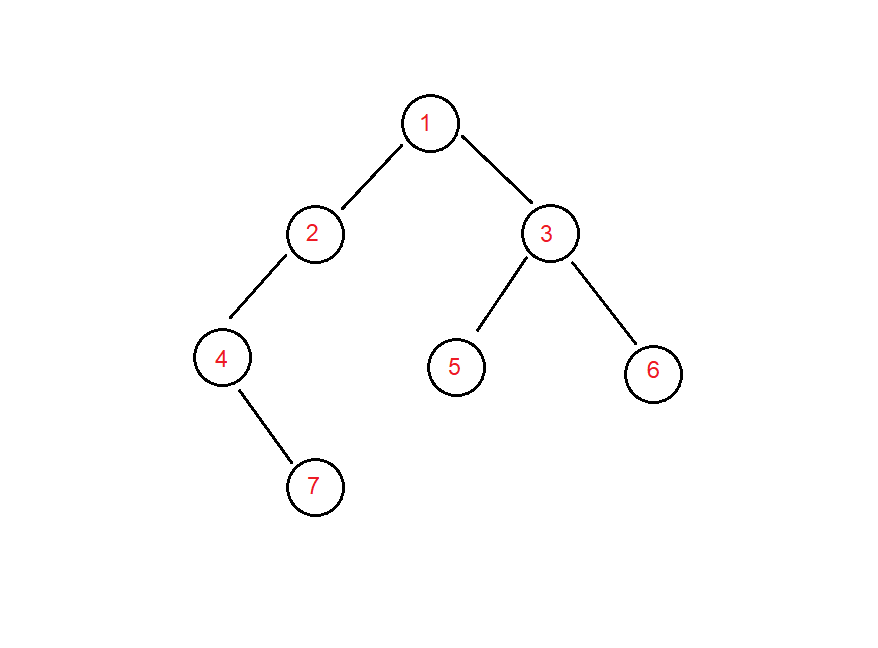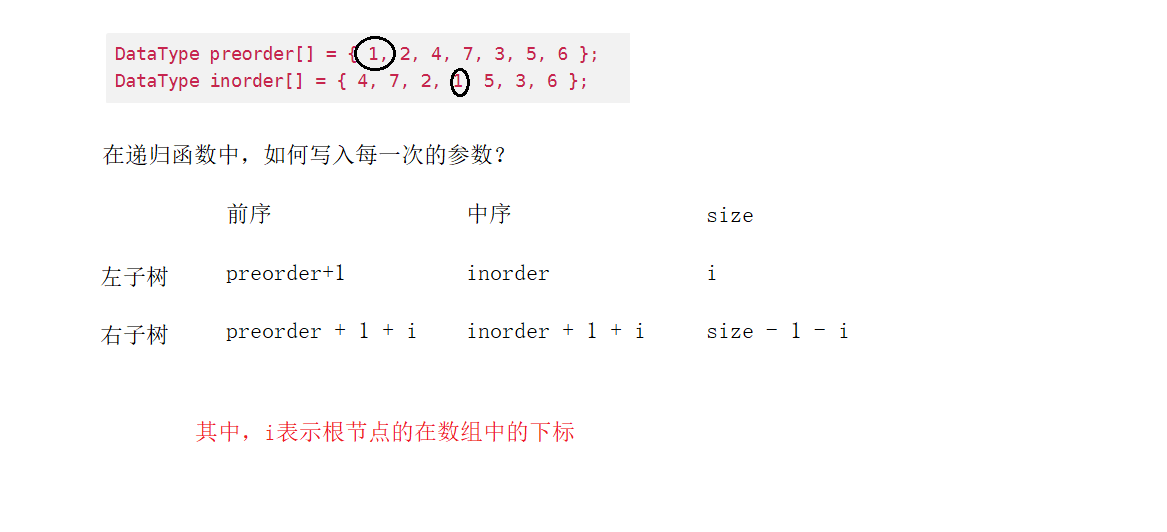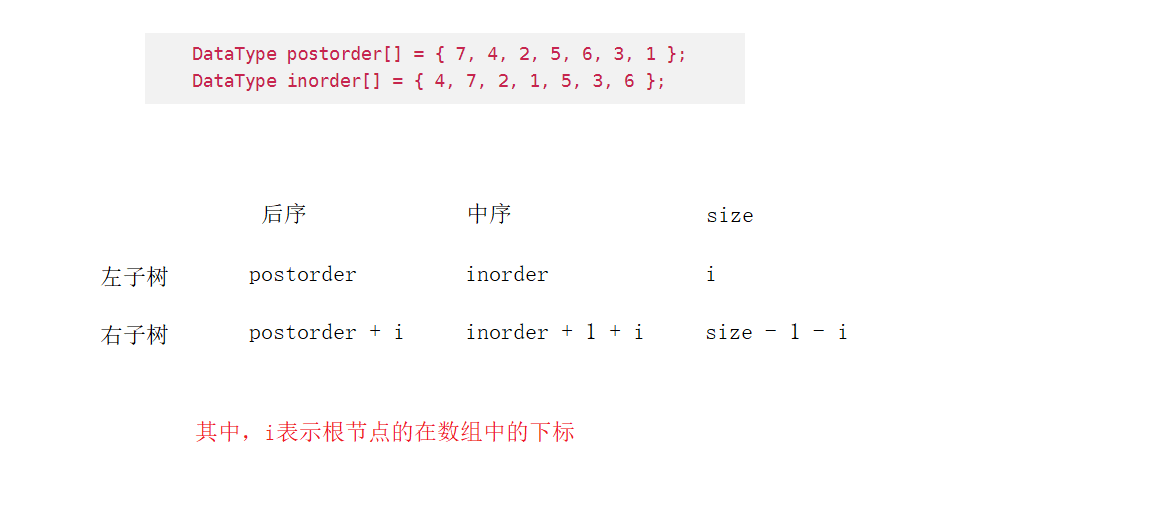- Create a binary tree based on preceding and intermediate traversal
- Create a binary tree based on sequential and intermediate traversal
Note: It is impossible to restore a binary tree accurately if only one of the three traversals is known.
Preorder and Medium Order Create Binary Trees
For example:
For such a binary tree, the corresponding preceding and middle traversal are:
DataType preorder[] = { 1, 2, 4, 7, 3, 5, 6 };
DataType inorder[] = { 4, 7, 2, 1, 5, 3, 6 };
So how to restore the binary tree?
The first step is to find the root node of the binary tree by traversing in order.
Step 2: Find the root node in the middle order traversal, and separate the left subtree from the right subtree.
Step 3: Think of the left subtree as a binary tree, and then follow these steps, so does the right subtree.
Recursive formula:
If the root node is created, both the left subtree and the right subtree are created. All you need to do is to create the root node.
Root - > left = left subtree; root - > right = right subtree;
Termination conditions:
_size== 0; //size indicates the number of nodes in the binary tree in this lesson, because we pass numbers.
The number of elements in a group of trees to create a binary tree is the number of elements in a group of trees.
The code is as follows:
typedef int DataType;
typedef struct BNode
{
DataType data;
struct BNode *left;
struct BNode *right;
}BNode;
BNode* CreateNewBNode(DataType data)
{
BNode *newBNode = (BNode *)malloc(sizeof(BNode));
newBNode->data = data;
newBNode->left = NULL;
newBNode->right = NULL;
return newBNode;
}
BNode *CreateBinaryTree(DataType preorder[], DataType inorder[], int size)
{
//Termination condition
if (0 == size)
{
return NULL;
}
DataType rootValue = preorder[0];
int i = 0;
//Location of root node in middle order traversal
for (i = 0; i < size; i++)
{
if (inorder[i] == rootValue)
{
break;
}
}
//Create the root node
BNode *root = CreateNewBNode(rootValue);
//Left tree
BNode *Tleft = CreateBinaryTree(preorder + 1, inorder, i);
root->left = Tleft;
//Right subtree
BNode *Tright = CreateBinaryTree(preorder + i + 1, inorder + i + 1, size - 1 - i);
root->right = Tright;
return root;
}
void test()
{
DataType preorder[] = { 1, 2, 4, 7, 3, 5, 6 };
DataType inorder[] = { 4, 7, 2, 1, 5, 3, 6 };
int size = sizeof(preorder) / sizeof(preorder[0]);
BNode *root = CreateBinaryTree(preorder, inorder, size);
}
Creating Binary Trees in Postorder and Medium Order
For the above binary tree, the post-order and middle-order traversals are respectively:
DataType postorder[] = { 7, 4, 2, 5, 6, 3, 1 };
DataType inorder[] = { 4, 7, 2, 1, 5, 3, 6 };
In fact, the idea of creating binary trees by post-order and mid-order traversal is the same as that of creating binary trees by pre-order and mid-order traversal. The only difference is the recursive function parameters.
The code is as follows:
BNode *CreateBinaryTree(DataType postorder[], DataType inorder[], int size)
{
if (0 == size)
{
return NULL;
}
DataType rootValue = postorder[size - 1];
int i = 0;
for (i = 0; i < size; i++)
{
if (inorder[i] == rootValue)
{
break;
}
}
BNode *root = CreateNewBNode(rootValue);
BNode *Tleft = CreateBinaryTree(postorder, inorder, i);
root->left = Tleft;
BNode *Tright = CreateBinaryTree(postorder + i, inorder + i + 1, size - 1 - i);
root->right = Tright;
return root;
}
void test1()
{
DataType postorder[] = { 7, 4, 2, 5, 6, 3, 1 };
DataType inorder[] = { 4, 7, 2, 1, 5, 3, 6 };
int size = sizeof(postorder) / sizeof(postorder[0]);
BNode *root = CreateBinaryTree(postorder, inorder, size);
}
int main()
{
test1();
return 0;
}
In binary tree, we often use recursion. When we use recursion, we often use recursion formulas and termination conditions.
Recursive Formula: If both left and right subtrees are available, there are three nodes in the binary tree that operate downward.
Termination Conditions: Generally, recursive normalization must have termination conditions. Considering termination conditions according to the five basic forms of binary tree is a little simpler.
Finally, we need to consider whether the parameters in the recursive function will change.